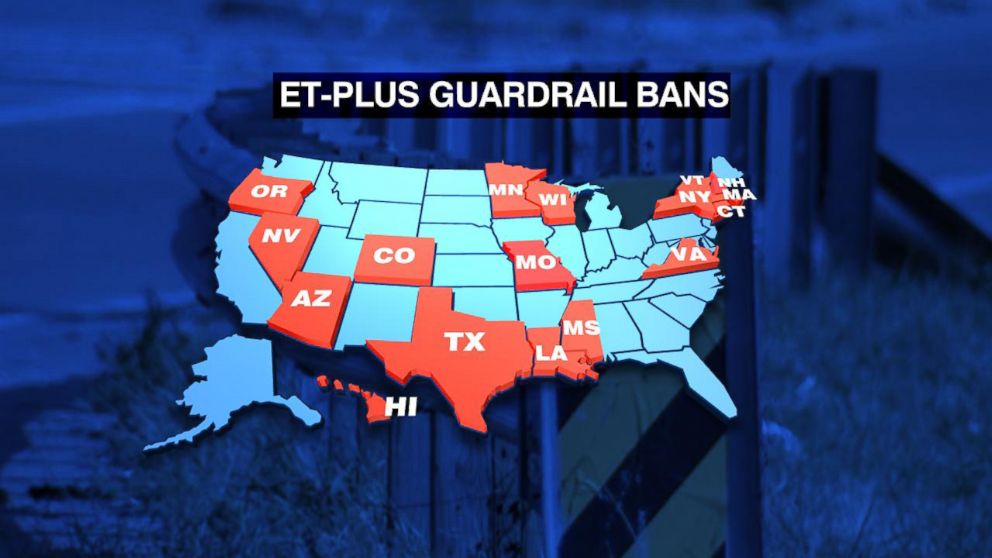Controversial Guardrail Nearly 4x More Likely Involved In Fatal Accident, Study Says
17 states halt use of guardrail, one considers tearing them from highways.
— -- A university study has concluded that the redesigned version of a controversial but widely-used guardrail system places motorists at a higher risk of serious injury and fatality on America’s highways than its previous version.
The study, first reported by ABC News last month before it was finalized, was conducted by the University of Alabama-Birmingham and examined serious and fatal accidents in Missouri and Ohio.
“To date… in both states, it was found that the ET-Plus placed motorists at a higher level of risk of both serious and fatal injuries relative to its predecessor, the ET-2000,” reads the final version of the report, obtained by ABC News today. “The overall trend for [both] states included in the analysis shows that the ET-Plus is 1.45 times more likely to be involved in a severe injury than the ET-2000. More poignantly however, the ET-Plus is 3.95 times more likely to be involved in a fatal crash than the ET-2000.”
The ET-Plus System, produced by Trinity Industries starting nearly a decade ago, was the subject of an ABC News “20/20” investigation in September that looked into allegations from crash victims that the guardrail can malfunction when struck from the front by their vehicles’. Rather than ribboning out and absorbing the impact as designed, the guardrails “locked up” and speared straight through the cars, severing the motorists’ limbs in some cases.
According to an internal email obtained by ABC News, a company official estimated one particular change – reducing a piece of metal in the guardrail end terminal from five inches to four – would save the company $2 per guardrail, or $50,000 per year.
Last week, a jury in Texas found that Trinity Industries had defrauded the government by altering the guardrail end terminal design back in 2005 and failing to disclose all of the changes to federal officials as required. Trinity, which said the decision "will not withstand legal scrutiny," was ordered to pay $175 million in damages – an amount that is expected to triple by statutory mandate. The judge in that case has ordered both sides into mediation by the end of the year.
The UAB study was sponsored by the Missouri Highways and Transportation Commission and The Safety Institute, a non-profit advocacy organization. The Missouri Department of Transportation was one of the first states to ban the use of the ET-Plus guardrail last month, citing concerns that the system “is not performing as intended and could pose the risk of malfunctioning.”
Seventeen states have now said they have decided to halt installation of the guardrail system, including Trinity’s home state of Texas.
“I think states that aren’t taking action are looking at this a little differently now than they were maybe even a couple weeks ago,” said Sean Kane, founder of The Safety Institute, one of the study’s sponsors.

On Monday, Virginia became the first state to say it’s planning to physically remove the end terminals from its highways after the company didn’t meet a deadline to submit crash test plans to the state. A spokesperson for the state’s department of transportation told ABC News there is no finalized timeline to remove the end terminals, and should Trinity provide data proving the ET-Plus meets safety criteria, it will reconsider the recall.
Trinity Industries told ABC News in a statement that it is “moving expeditiously to initiate” crash tests that had been previously requested by the state.



